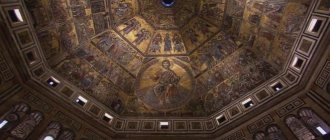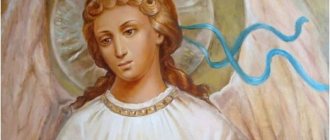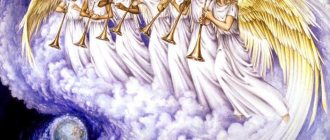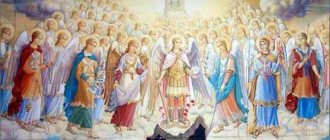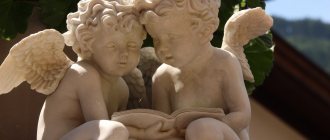Fallen angel: biblical version of his appearance + 9 main “characters” + 4 stories + mystical life story + 1 way to summon the entity + 5 literary works on the topic.
What unearthly creatures are there in our Universe, where did they come from and what powers do they have - these questions have long worried inquisitive human minds. And one of the greatest mystical mysteries is fallen angels.
Who is this, what literature and esotericists say about them - let's figure it out together.
What does the Bible or History say that pride is not always good!
The most detailed story about the appearance of fallen angels is undoubtedly contained in the Bible, more precisely, the Old Testament.
According to Christian teaching, Satan himself can be considered the first fallen angel: being a sinless creature with free will, he became proud and rebelled against the Creator. And God drove him away from himself.
Theologians call the main reason for the expulsion of Lucifer his pride.
But Lucifer did not leave alone - he took with him about two hundred minions - the same rebellious angels. This is how hell appeared.
And the existence of the fallen angels was divided into “before” and “after” the fall.
| BEFORE | AFTER |
| Had the opportunity to enjoy communication with the Creator | Were left to our own devices |
| Invisibly helped in the formation of the church | They began to fight against churches and clergy |
| They did only good things | They did and are doing evil |
| Helped ordinary people in everyday affairs | On the contrary, they began to put spokes in the wheels |
| Directed people towards goodness, light and joy | They push people to sin, seducing them in every way |
However, even this event, according to some esotericists, was allowed by God for a reason: they say, God and Satan are two hypostases of the Creator. And evil exists so that, voluntarily, overcoming his sinful nature, a person approaches holiness. Like, without the Fall there is no virtue.
This point of view is reflected in many works of art. Remember the same “The Master and Margarita” by Bulgakov.
Amazing stories about those who abandoned the Creator
Thus, the Jewish Book of Enoch says that before they rebelled against God, the fallen angels were called Watchers. Their mission was to monitor how people fulfill the will of the Creator. But seeing beautiful women, the angels felt carnal desire for the first time. And this was the beginning of their downfall.
The Testament of Solomon tells that Solomon called upon the fallen angel Beelzebub, who persuaded people to worship Satan, and also incited wars and provoked jealousy in married couples.
Revelations tell how Archangel Michael, at God's command, defeated the army of Lucifer and cast him into the abyss of hell. Satan appeared in the form of a dragon.
In Ezekiel, a lot of attention is paid to what Lucifer was like before his fall - wise, bright and knowledgeable.
But the Bible wasn’t the only one talking about fallen angels.
Names of Angels and Archangels
Archangel is the highest angel, messenger of God. In cinema and stories, three archangels are most often mentioned: Michael, Gabriel, Raphael.
Archangel is the highest angel, messenger of God. In cinema and stories, three archangels are most often mentioned: Michael, Gabriel, Raphael. But if you turn to religious literature, you can find references to a larger number of Archangels. In the Orthodox Church, Archangels are most often mentioned with the names: Michael, Gabriel, Raphael, Uriel, Selaphiel, Yehudiel, Barachiel, Jeremiel, Sikhail, Zadkiel, Samuel, Jophiel. These names are also mentioned in other religions. Names of the Archangels In the Jewish apocrypha, “The Book of Enoch,” the highest angels include seven Archangels: Lucifer is a fallen archangel who goes against God.
Uriel is the ruler of the heavenly bodies, the angel of peace. Enlightener of non-believers. Raphael is the ruler of human thought, capable of healing. Raguel is the one who punishes the world of luminaries. Sariel is the leader of the spirits that seduce and draw people into sin. Gabriel is the guardian of paradise and the leader of the spirits who help people. A mentor on the true path.
Angel Names
Aarin is a term used to describe the Angels who descend from heaven in search of the daughters of men to produce the Nephilim, appearing in the book of Enoch.
Abaddon - Angel of the Abyss. Abalim - “Great Angel”, fiery guardian. Abdiel is a courageous “fiery seraph” from Milton’s Paradise Lost. Adimus - An angel revered by the church, probably descended from the first man. Adoel - The Angel who controlled the explosion that created the Universe (Angel of the Big Bang), according to the Book of Enoch. Af (Af) is a terrible Angel, consisting of red and black flames. Ahiah: half-Angel, son of Semyaza. Akhazriel - "Messenger of God." Amaliel - Protector of the weak. Anahita is a fiery female angel associated with water and Persian myths. Anaiel - Angel who gave knowledge to humanity, according to the book of Enoch. Anak - "giant", mortal with the blood of an Angel. Anakim - "giants", a race of fierce giants, are mentioned in the Bible as the descendants of giants. Anaphiel - high Merkabah Angel, bearer of the seal. Angelos - translated from Greek: “messenger”, heavenly being. Aphaeleon - ruler of the fallen Angels, listed in treatises on ceremonial magic. Appolyon - Angel of the Abyss. Arakiba - Angel from the Book of Enoch. Aralim - “great angel” of the throne, fiery guardian. Araquiel - taught the signs of the earth, from the book of Enoch. Arariel - Angel of the oceans, patron of fishermen, medieval Angel of knowledge. Arkon (Archon) - Angel-manager of the material world, from the Gnostic myth. Ariel - “lion of God”, spirit of the air, sources: Hebrew myths, also appears in Shakespeare. Arioch - one of the fallen Angels, according to Milton's Paradise Lost, also appears in the works of Michael Moorcock. Ariuk is Enoch's guardian, according to his book. Armaros - taught humanity magic, from the book of Enoch. Armisael - Angel of childbirth. Asaph - Angel who was supposedly the author of Psalms 73-83. Asuriel - Angel who warns of the flood, from the book of Enoch. Azazel - taught people to make metal and mine precious stones, from the book of Enoch. Azrael - Angel of Death, appears in the works of Leila Wendela. Ballaton - guardian, name used in Solomon's magic. Baradiel - heavenly prince, Angel of the city, from the book of Enoch. Baraqiel - heavenly prince, Angel of Lightning, from the Book of Enoch. Barattiel - supports the highest heavens, from the book of Enoch. Bethor - Angel of Jupiter, mentioned in ceremonial magic. Boamiel - Angel from the 4 edges of heaven, mentioned in ceremonial magic. Boel - Angel of Saturn. Camael - “one who sees God.” Camiel is a variant of the name Kamael, "he who sees God." Caphriel - Angel of the Sabbath. Cassiel - Angel of tears and abstinence, mentioned in ceremonial magic. Cerviel - Angel of the Principalities. Chalkydri - or “brazen serpent” or satellite of the Sun, from the book of Enoch. Chamuel - “one who seeks God.” Chasan - patron of the air, mentioned in ceremonial magic. Daniel - “God is my judge,” also the name of a prophet in Hebrew. Dubbiel - protector of the Persians. Duma - Angel of Silence, is also the patron saint of Egypt. Empyrean - the highest heaven, heavenly fire, mentioned in Milton's Paradise Lost. Ephemera - “short-lived” Angels who were created to sing the praises of God. Erelim - “brave”. Exousia - “power” or “virtue”, alternative to Angel, Greece. Ezequiel - taught humanity the knowledge of clouds, from the book of Enoch. Gabriel - "God is my strength", Angel of Judgment, one of the Angels who is introduced by name in the Bible. Gadiel - designed to ward off evil, mentioned in ceremonial magic. Gadriel - taught people the arts of war, from the book of Enoch. Gagallim - “sphere”. Gazardiel - Angel of dawn and dusk. Germael - "greatness of God", Angel of creation. Gezuriya - Angel of powers. Gibborim - a giant half-Angel, "man of glory", mentioned in Jewish and biblical treatises. Gregory (Grigori) - from Greek “looker”. Gabriel - Angel of empowerment. Hadariel - "The Glory of God." Hadramiel - "Glory of God", a variant of the name Gabriel. Hamon - heavenly prince, mentioned in the book of Enoch. Haniel - "God's grace." Haroth - twin of Maroth, knew the secret name of God, mentioned in Persian myth. Hashmal - leader of order. Hayliel - wielder of the fiery whip, from the Book of Enoch. Hemah - a terrible Angel, consisting of black and red flames, is mentioned in Jewish treatises. Hochmael - "Wisdom of God." Irin - An alternative term for the Nephilim, it is believed that Ireland was named after him since he was the first to settle in that place. Ishim - Angel of Ice and Fire. Israfel - Angel of the Resurrection. Ithuriel - messenger of Gabriel, appears in Milton's Paradise Lost. Jabril is the Muslim version of Gabriel. Jael is the guardian of the Ark of the Covenant. Jeduthun - choirmaster, gives the status of Angels. Jehoel - leader and guardian, seraphim. Jeremiel - "God's mercy", version of Ramiel. Kadmiel (Jeremiel) - Angel of childbirth. Kajabiel - “Star of God”, Angel of Astrology. Kalmiya - guardian of the veil. Kasbiel - taught the name that binds oaths from the book of Enoch. Kasdeja - taught spiritualism and birth control, from the book of Enoch. Kemuel is a variant of Kamael, "one who sees God." Kerubiel - a formidable Angel of fire and lightning, leader of the cherub choir. Kezef - Angel of destruction. Kochbiel - “Star of God”, Angel of astrology. Lahabiel - protector and guardian. Laila (Lailah) - “night”, Angel of Conception, according to Muslim treatises: female Angel. Layla - variant of Layla, "night". Lucifiel - “light-bringer”, morning star, version of Lucifer. Lucifer is the most beautiful of the Angels, who challenged God, but was overthrown for his pride. Mahadiel (Machidiel) - “God is everywhere”, from the book of Enoch. Madan - Angel of Mercury, mentioned in ceremonial magic. Mahanaim - “two armies”, a heavenly army, mentioned in Jewish treatises. Malachi - "Messenger of God." Malakh - "messenger", celestial being, Muslim term meaning Angel. Maryuk - Enoch's guardian. Maroth - the twin of Garoth, who knew the secret name of God, is mentioned in Persian treatises. Mastema - "Angel of Accusation." Matariel - Angel of Rain. Melkyal - “God is everywhere”, from the book of Enoch. Merkabah - “chariot”, the mystical path to God. Metatron - Angel of presence, divine archivist, mediator of God. Michael (Michael) - Sword of God and heavenly warrior-prince, one of the archAngels, whose name is mentioned in the Bible. Mikhal is a variant of Michael, “Like God.” Mumiel - guardian of health. Muriel - Angel of Order. Nakir is a black and blue-eyed Angel of Justice. Nathaniel - "Given by God", Angel of Fire. Nephilim - giant half-Angel, "glorious man." Nuriel - Angel of the City. Onafiel - Angel of the moon. Ophaniel - snake angel. Ofanim (Ophanim) - “wheel”, “many-eyed”, can also be attributed to snakes. Oriel - Angel of fate. Orifiel - Angel of the planet Saturn. Pahadron - Angel of Terror. Peliel - leader of the choir of Virtues. Penemu - taught people writing, from the book of Enoch. Peniel - “He who has seen God.” Phanuel - Angel of presence, Angel of repentance. Purah - Angel of oblivion. Puriel is a harsh judge. Quadisin (Qaddisin) - “saints”, stand next to Gregory. Qaphsiel - repels his enemies. Radbos (Rabdos) - guardian of the stars. Raduriel - celestial archivist, from the book of Enoch. Raguel - "Friend of God." Rahab - a cruel Angel of the sea, supposedly killed by God, angry with him for some act. Rahatiel - ruler of the constellations, from the book of Enoch. Rahmiel - Angel of Mercy. Ramiel - "Grace of God", Angel of Thunder. Raphael - “God's healing”, Angel of the sun, archangel, his name is mentioned in the Bible. Raziel - Angel of the Earthquake, from the Book of Enoch. Razael - Angel of secrets, there is a belief that he was punished by God for giving a book of magic to Adam. Remiel - translator of visions from the book of Enoch. Rikbiel - keeper of the chariot of God, from the book of Enoch. Ruhiel - Angel of the winds. Sabaoth - He was worshiped as an Angel in the Middle Ages, in Hebrew: Heavenly Army. Sahaqiel - guardian of the fourth heaven, from the book of Enoch. Salathiel - “Inquirer of the Lord.” Samael - "Poison of God", a formidable Angel of Death, he is associated with Satan/Lucifer. Sandalphon - “brother”, Greek Angel of glory and prayer. Saraquiel - a variant of the name Aracuel, taught forbidden knowledge, from the book of Enoch. Sariel - “Prince of God”, rules the spirits, from the Book of Enoch. Semalion - Angel of Proclamation. Semsapiel - mentioned in the book of Enoch. Semyaza - Leader of the Angels who descended from heaven to marry the daughters of men, sometimes associated with Lucifer and/or Satan. Seraph - living fire, holy angel, the name can mean: “fiery snake.” Seraphiel - eagle-like, chief Seraphim. Shamsiel - "Light of God", from the Book of Enoch. Sidriel - Prince of Virtue, from the Book of Enoch. Sopheriel is the keeper of books about life and death. Soterasiel - “one who causes God's fire.” Tabris - Angel of free will. Tadhiel - Angel of sacrifice. Tagas - heavenly prince, mentioned in the book of Enoch. Tamiel - mentioned in the book of Enoch. Tarshishim - “shining”. Tatrasiel - heavenly prince, mentioned in the book of Enoch. Temlakos - patron saint of abused children, Greece. Turiel - mentioned in the Book of Enoch. Uriel - "God's Flame", sometimes the Angel of Healing, sometimes the Angel of Death. Uziel (Usiel) - “The Strength of the Lord”, from the book of Enoch. Vretiel - Angel of Wisdom from the Book of Enoch. Yahoel - protector and guardian, seraphim. Zadkiel - Angel, his symbol is a dagger, from the book of Enoch. Zagzagel - Angel of the burning bush. Zakum - Angel of prayer. Zambrim - ruler of the fallen Angels, mentioned in ceremonial magic. Zaphkiel - faster than cherubs. Zarall is the guardian of the Ark of the Covenant. Zephon - messenger of Gabriel, mentioned in Milton's Paradise Lost. Zophiel - "The Beauty of God." Zuriel - “The Lord is my stronghold.”
Valery Rozanov Doctor of Psychology
Greek myths and Jewish scriptures: what do they say?
There is a theory according to which the same Zeus and Apollo from Greek mythology became the prototype of the fallen angels in the Bible. They were also super beings, but at the same time they could not resist relationships with earthly women.
The Jewish book of Enoch speaks about the same thing: “children of heaven” walked among ordinary people, and from them children were born to earthly women.
As they say, representatives of the weaker half of humanity are involved here too.
And in all the stories that I heard about fallen angels, a woman certainly appeared. I will tell you only one of them.
The story of a strange stranger, or is it worth giving people lifts in the middle of the night?
This story was told to me by my close friend Andrei, whose honesty there is no doubt.
Late one night he was driving across a bridge. A girl was voting on the bridge.
“I felt sorry for her: in a light dress, thin, small, what did she forget on the bridge at 2 am? I stopped and picked her up.” - said the guy.
And then something strange began... He was supposed to take the girl to the highway, but instead, as if under hypnosis, he listened to her and drove into some village.
“This is where I come out!” - said the girl.
Andrei turned around and saw not the girl who was getting into his car, but something unreal: “Her eyes were burning, with some kind of dashing flame, she seemed to have turned black, and two dark wings were visible behind her. It became very scary! I think it was something like an evil spirit, a fallen angel,” he said.
The young lady came out and seemed to disappear into thin air.
And everything could be attributed to Andrei’s fatigue, but when he came to his senses, a black feather remained in the back seat of the car, where his passenger was sitting...
As it turned out, local residents have “known” this girl for a long time and do not risk giving her a lift.
In such cases, mystics remember the demonesses Lilith and Kasikandrieru - the mistresses of hell.
Are you not a timid person? Then you can try to summon a fallen angel.
Orthodox Life
Orthodox portal "Jesus"
Did God foresee that some of the angels would depart from Him?
The law of God is the law of Love, deviation from it gives rise to sin. But can we assume that Dennitsa’s falling away from God—and the emergence of evil—was inevitable? Can we consider that sin has its own beginning in the world of God, the world of the omnipotent, incomprehensible Lord, who himself is Love and Truth? There can be only one answer: it is absolutely impossible.
However, in this case, we are faced with two key questions connected by a common chain of concepts:
1) Why did God allow Dennitsa to fall away?
2) And much more complex: what is the role of human free will in the atoning sacrifice?
To answer them, we need several reference points that we need to understand:
1) Dennitsa before the fall - divine knowledge, a reflection of free will;
2) Pride, which causes a falling away from God, is a consequence of the denial of God’s providence and the infinity of divine knowledge;
3) Love, infinite knowledge is the truth, which is a reflection of free will;
4) Divine knowledge is love, and it is as true as the image of God in His creation; denying it is blasphemy;
5) A person has the opportunity to inherit salvation, but in order to turn to God, metanoia was necessary - atonement on the cross;
6) God is incomprehensible, His providence cannot be understood, but in trust in divine love the formation of true free will takes place.
First of all, we must ask the question: who are the angels in the Christian faith? Bishop Seraphim (Zvezdinsky) in his work “Angels” writes:
By their nature, the word of God teaches us, angels are spirits. Are not all spirits of service, says the ap. Paul, - sent to minister for those who will inherit salvation (Heb. 1:14).
Blessed Theophylact of Bulgaria interprets these words as follows:
Look what little difference He makes between creatures; Although there is a great distance between angels and people, he placed them close to us, for creatures do not rise much above creatures. <...> Note that the angelic work is to serve the salvation of people, but more so the work of Christ Himself. Therefore, such service should not be neglected.
Thus, the main thing that we need to understand about the nature of angels for the purposes of this work is that they are supposed to serve as inheritors of salvation. This is an interesting term, and we will look at it in more detail.
As it becomes clear from the interpretation of Blessed Theophylact, these words mean humanity, but a caveat is important here. Namely: all people have the opportunity to inherit salvation, but inheriting salvation is possible only by living according to the law of God. This remark is extremely important for our research.
But let us return to the question of angelic nature. Bishop Seraphim also notes the most important quality inherent in angels:
Angels can no longer sin. At first, according to the teachings of Blessed. Augustine, were created by God with the ability to sin, then, by the steady exercise of their will in good, they passed into the state of being able not to sin, and finally, strengthened in obedience to God, by the power of divine grace, they became so perfect that they reached the state of the impossibility of sinning.
The key point in understanding the nature of angels is the remark about their “steady exercise of their will in good,” in which, having strengthened themselves, they “by the power of divine grace have become so perfect that they have achieved the impossibility of sinning.”
We should pay attention to this semantic connection. Angels, as creatures of God, have free will, according to Christian doctrine. That is why the Lord, who is Love and Truth, did not show violence against their will, and that is why the angels could also sin. However, through the exercise of the will in goodness, and - what is important - the power of divine grace - they achieved the perfect state of the impossibility of sinning.
It is also worth saying in more detail about the power of divine grace.
How should these words be interpreted? It seems to us that it would be correct to speak about the power of God’s mercy, incomprehensible to human and no other created understanding, granting salvation to those who inherit it and revealing infinite knowledge. Accepting or denying it inclines free will towards truth or blasphemy, respectively.
So, we must approach the first question of our work: why did God allow the falling away of Dennitsa, the emergence of evil in the world He created. And, speaking about the falling away of the angel of God, we should turn to the main source of Christian doctrine - the Bible.
In the text of the Old Testament, it is worth paying attention to chapter 28 of the Book of the Prophet Ezekiel, and chapter 14 of the Book of the Prophet Isaiah:
You were in Eden, in the garden of God; your garments were adorned with all kinds of precious stones; ruby, topaz and diamond, peridot, onyx, jasper, sapphire, carbuncle and emerald and gold, everything skillfully placed in your nests and strung on you, was prepared on the day of your creation. You were an anointed cherub to overshadow, and I appointed you to do so; you were on the holy mountain of God, walking among the fiery stones. You were perfect in your ways from the day you were created, until iniquity was found in you (Ezek. 28:12-15).
How you fell from the sky, Lucifer, son of the dawn! crashed to the ground, trampling the nations. And he said in his heart: “I will ascend into heaven, I will exalt my throne above the stars of God, and I will sit on the mountain in the assembly of gods, on the edge of the north; “I will ascend above the heights of the clouds; I will be like the Most High.” But you are cast into hell, into the depths of the pit (Isa. 14:12-15).
From the above passages it is clear that the reason for the falling away of the angel of God was pride. It must be noted here: the falling away was not inevitable, since evil has no origin of its own in the world of God; but where pride arises, falling away from God is inevitable.
Let us analyze the biblical narrative within our theses proposed at the beginning of this study.
Dennitsa - before falling away - divine knowledge, a reflection of free will. Angels are spirits; they are not from the physical world, but from the heavenly world. And God has endowed them with free will since their creation. As we have already noted, initially they could sin, but it is important to point out another important point here: angels are called to serve people. The free will of angels is as much of divine origin as the will of man, but angels do not know material thirst or hunger, but only spiritual thirst; which is why their ability to sin has a different quality, since everything occurs on the non-corporeal plane.
Pride, which causes a falling away from God, is a consequence of the denial of God's providence and the infinity of divine knowledge. We must again turn to the concept of divine grace. Speaking about the power incomprehensible to human and any other created understanding, coming from divine Love and revealing infinite knowledge, it is impossible not to note that the pride that contributed to the falling away of Dennitsa from God is opposed to the angelic nature itself, and makes it impossible to comprehend the Truth. Truth, in turn, is a manifestation of God’s providence. And here there is one more interesting point that requires pointing out.
According to Christian doctrine, God himself is Truth. However, we cannot identify her with the incomprehensible Lord. Yes, God is Truth, and everything true is divine, and yes, Truth cannot be separate from God. But the omnipotent and incomprehensible Lord is primary, infinite and beginningless, while Truth should be considered as something secondary.
Therefore, we come to the conclusion that Truth is a reflection of divine Love, which bestows free will on God’s creatures. And the fall of the angel in the opposition of Truth to God, that Truth can be without God and even greater than God. This is the pride of Dennitsa, which made blasphemy possible.
But this was not the only reason for the angel’s falling away. If evil cannot have its own origin in the world of God, then how did the perverted will of Dennitsa, a perfect angel, become possible?
Blessed Aurelius Augustine himself asks this question:
If he himself, by his perverted will, turned from a good angel into a devil, then where does this evil will come from in him, which made him a devil, when he, a perfect angel, was created by a good Creator?
And the holy ascetic finds the answer to it:
It became clear to me that only good things can become worse. If it were absolute good or not good at all, then it could not become worse. Absolute good cannot become worse, and in that which has no good at all, there is nothing to become worse.
And besides:
And for You there is no evil at all, not only for You, but also for Your entire creation, for there is nothing that would break in from the outside and break the order that You have established. It is considered evil that something taken separately does not agree with something, but the same thing agrees with something else and turns out to be good and good in itself.
It becomes clear that absolute good is what God’s creatures should strive for with their will. This was the work of angels.
The fall of Dennitsa became possible because, endowed with free will, he allowed absolute good, which is the true image of God in His creations, without acquisition. Aurelius Augustine directly says that “that which, taken separately, does not agree with something is considered evil, but the same thing agrees with something else and turns out to be good and good in itself.”
Partial Truth is impossible, and it is impossible to separate a part from it. And the achievement of absolute good is possible only in harmony with it, in harmony with the Lord. But it is impossible to be in tune with God, finding answers by your own will; but the answers are found only by divine grace. When you try to comprehend the answers only with your will, the will becomes not free, but enslaved by sin. And consonance becomes impossible, and a falling away from God occurs.
So why did the almighty Lord allow Dennitsa to fall away? Yes, so that the free will of God’s creatures has salvation, so that it is not destroyed by sin.
Blessed Augustine in the text of “Confessions” notes this, already touching on the fall of people:
The angel has rolled down, the human soul has rolled down. From them we see in what a deep and dark abyss all spiritual creatures would be if You had not said at the beginning “let there be light!” and there was light” and all the intelligent spirits of Your heavenly city would not hastily cling to You, having rested in Your Spirit….
Man has the opportunity to inherit salvation. But from Sacred History we know that in order to turn to God, metanoia was necessary - atonement on the cross.
Redemption that comes from God and is accomplished by Christ. The book of the prophet Isaiah states:
He chases dust; a deceived heart has led him astray, and he cannot free his soul and say: “Is there not deceit in my right hand?” Remember this, Jacob and Israel, for you are My servant; I formed you: My servant, O Israel, do not forget Me. I will blot out your iniquities like a cloud, and your sins like a cloud; turn to Me, for I have redeemed you. Rejoice, O heavens, for the Lord has done this. Shout, O depths of the earth; make a noise of joy, mountains, forest and all the trees in it; for the Lord has redeemed Jacob and will be glorified in Israel (Isa. 44:20-23).
The redemption of a deceived heart is accomplished not by corruption, but by the blood of Christ. So how long can a person search for the truth, while divine grace reveals what is beyond human weakness? What is his role in the atoning sacrifice?
To answer these questions, let us again turn to the sacred texts of the Old Testament. In the book of the prophet Ezekiel the following words are given:
They will throw their silver into the streets, and their gold will be neglected. Their silver and their gold will not save them much in the day of the wrath of the Lord (Ezek. 7:19).
We allow it to be understood as follows: not a single human truth is capable of touching the divine truth, and therefore a deceived heart cannot atone for its weakness, which is likened to sin, but is granted by the Lord: “For thus says the Lord: “You were sold for nothing, and without money you will be redeemed” (Isa. 52:3).
But what is the role of human free will in the atoning sacrifice?
Here we come to the last thesis of this work: God is incomprehensible, His providence cannot be understood, but in trust in divine love the formation of true free will takes place.
Let's look at this position in more detail.
St. Isaac the Syrian, in his conversation “On trust in God, born from knowledge of the truth and from true faith...” notes:
He who fears sin does not fear Satan. And all who thirst for gifts are not afraid of temptations. And the one who firmly believes that the finger of “God” governs His entire creation is not disturbed by anything.
For knowledge of the truth fills the heart with peace and strengthens a person in joy and confidence. His advice is many and delightful: they are true and enlighten the eyes. <…>
For lack of faith deprives a person of true knowledge of God and the trust in Him that he should have at every moment.
It becomes clear that only with trust in God, with the recognition of one’s free will as His Truth and the Truth inseparable from Him, and with the recognition of the incomprehensibility of the Lord, is faith possible. What is faith? Faith is the manifestation of God towards the slightest, insignificant will of man towards Him.
Only in determination can one have faith, and it is in the determination to be saved that humanity’s role in the atoning sacrifice lies. And the formation of the free will of those who inherit salvation takes place - true, such as it was according to God's providence. And pride is redeemed, and angelic perfection is achieved - the quality of absolute virtue, when a person can no longer sin.
Daria Frolovskaya
How to summon a fallen angel and remain unharmed: a method for the bravest
To perform the ritual you will need:
- cat skull (color and breed does not matter). The cat must die a natural death - from old age or illness;
- hemp seeds;
- black lace.
Wait until the full moon and go to a deserted intersection where no one will stop you from performing the ritual.
Next, proceed strictly according to the instructions:
- Exactly at midnight, place the cat's skull in the middle of the intersection and say the spell 3 times, without hesitation or pause:
“As the night is black, so are your souls.
They became proud, washed themselves with tears and went to hell.
But I want to see you, I’ll treat you,
Then I'll let you go. Let it be so.
No harm to me, no fear.”
- Wrap the skull in black string and bury it near the nearest tree.
- Now go home without talking to anyone or looking back. From time to time you need to throw in a hemp seed.
Psychics say that if you are internally strong enough to see a fallen angel, you will meet him before you reach home.
He may look like an ordinary person, but the demonic gleam of his eyes and strange questions to you (for example, “How do you want to die?”) will not allow you to be mistaken.
Important: you should not call a fallen angel if you cannot repeat the ritual exactly or are not sure that you are ready for this meeting. Calculate your strength!
How did the fallen angels appear?
It is generally accepted that the fall of the angels began with the victory of the army of God, led by the Archangel Michael, over the army of the Devil. As you know, Dennitsa (known as Lucifer) was the most beautiful and bright angel, he was closest to God. However, Lucifer became proud of himself and tried to put himself on an equal footing with the Creator. This behavior infuriated God, Lucifer was very dissatisfied and rebelled against paradise, gathering many followers who later became demons.
A large number of the future fallen angels were the most powerful servants of God. All future demons had their own goals and motives.
- For example, the demon Abaddon had destructive power, this should have been his advantage. He took the chance to continue this business without any restrictions.
- Another demon named Gaap sought to realize his ideas and saw such an opportunity in joining Lucifer. At the same time, Gaap very often carried out his plans by helping people.
- The demon Asmodeus thirsted for power and strength, and he also did not miss the opportunity. There is also another reason for the fall of angels: the so-called essence, which did not allow them to grow spiritually.
No holy scripture mentions the exact time of the fall of the angels. For example, Christian sources claim that it was Satan who began the Fall. At the same time, ancient Jewish sources describe Samael , the strongest of the angels, who tempted Adam and Eve, who despite this was not punished.

